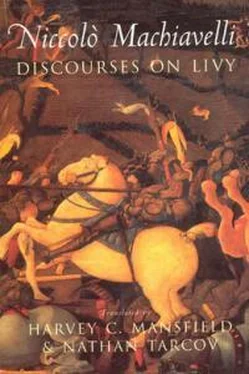Николо Макиавелли - Discourses on Livy
Здесь есть возможность читать онлайн «Николо Макиавелли - Discourses on Livy» весь текст электронной книги совершенно бесплатно (целиком полную версию без сокращений). В некоторых случаях можно слушать аудио, скачать через торрент в формате fb2 и присутствует краткое содержание. Год выпуска: 2014, Издательство: epubBooks Classics, Жанр: История, Философия, на английском языке. Описание произведения, (предисловие) а так же отзывы посетителей доступны на портале библиотеки ЛибКат.
- Название:Discourses on Livy
- Автор:
- Издательство:epubBooks Classics
- Жанр:
- Год:2014
- ISBN:нет данных
- Рейтинг книги:5 / 5. Голосов: 1
-
Избранное:Добавить в избранное
- Отзывы:
-
Ваша оценка:
- 100
- 1
- 2
- 3
- 4
- 5
Discourses on Livy: краткое содержание, описание и аннотация
Предлагаем к чтению аннотацию, описание, краткое содержание или предисловие (зависит от того, что написал сам автор книги «Discourses on Livy»). Если вы не нашли необходимую информацию о книге — напишите в комментариях, мы постараемся отыскать её.
Discourses on Livy — читать онлайн бесплатно полную книгу (весь текст) целиком
Ниже представлен текст книги, разбитый по страницам. Система сохранения места последней прочитанной страницы, позволяет с удобством читать онлайн бесплатно книгу «Discourses on Livy», без необходимости каждый раз заново искать на чём Вы остановились. Поставьте закладку, и сможете в любой момент перейти на страницу, на которой закончили чтение.
Интервал:
Закладка:
The criterion of character afforded by a man's manners and conversation is a safer guide than the presumption of inherited excellence, but is far inferior to that afforded by his actions; for until he has given actual proof of his worth, his credit is built on mere opinion, which may readily change. But this third mode of judging, which originates in and rests upon his actions, at once gives him a name which can only be destroyed by his afterwards doing many actions of a contrary nature. Those therefore who live in a republic should conform to this third criterion, and endeavour, as did many of the Roman youth, to make their start in life with some extraordinary achievement, either by promoting a law conducive to the general well–being, or by accusing some powerful citizen as a transgressor of the laws, or by performing some similar new and notable action which cannot fail to be much spoken of.
Actions like this are necessary not only to lay a foundation for your fame, but also to maintain and extend it. To which end, they must continually be renewed, as we find done by Titus Manlius throughout the whole course of his life. For after winning his earliest renown by his bold and singular defence of his father, when some years had passed he fought his famous duel with the Gaul, from whom, when he had slain him, he took the twisted golden collar which gave him the name of Torquatus. Nor was this the last of his remarkable actions, for at a later period, when he was of ripe years, he caused his own son to be put to death, because he had fought without leave, although successfully. Which three actions gained for him at the time a greater name, and have made him more renowned through after ages than all his triumphs and victories, though of these he had as large a share as fell to the lot of any other Roman. The explanation of which is, that while in his victories Manlius had many who resembled him, in these particular actions he stood almost or entirely alone.
So, too, with the elder Scipio, all whose victories together did not obtain for him so much reputation, as did his rescue, while he was yet young, of his father at the Ticino, and his undaunted bearing after the rout at Cannæ, when with his naked sword he constrained a number of the Roman youth to swear never to abandon their country, as some among them had before been minded to do. It was these two actions, therefore, which laid the foundation of his future fame and paved the way for his triumphs in Spain and Africa. And the fair esteem in which men held him, was still further heightened when in Spain he restored a daughter to her father, a wife to her husband.
Nor is it only the citizen who seeks reputation as leading to civil honours, who must act in this way; the prince who would maintain his credit in his princedom must do likewise; since nothing helps so much to make a prince esteemed as to give signal proofs of his worth, whether by words or by deeds which tend to promote the public good, and show him to be so magnanimous, generous, and just, that he may well pass into a proverb among his subjects. But to return to the point whence I digressed, I say that if a people, when they first confer honours on a fellow–citizen, rest their judgment on any one of the three circumstances above–mentioned, they build on a reasonable foundation; but, when many instances of noble conduct have made a man favourably known, that the foundation is still better, since then there is hardly room for mistake. I speak merely of those honours which are bestowed on a man at the outset of his career, before he has come to be known by continued proof, or is found to have passed from one kind of conduct to another and dissimilar kind, and I maintain that in such cases, so far as erroneous judgments or corrupt motives are concerned, a people will always commit fewer mistakes than a prince.
But since a people may happen to be deceived as regards the character, reputation, and actions of a man, thinking them better or greater than in truth they are, an error a prince is less likely to fall into from his being informed and warned by his advisers, in order that the people may not lack similar advice, wise founders of republics have provided, that when the highest dignities of the State, to which it would be dangerous to appoint incapable men, have to be filled up, and it appears that some incapable man is the object of the popular choice, it shall be lawful and accounted honourable for any citizen to declare in the public assemblies the defects of the favoured candidate, that the people, being made acquainted therewith, may be better able to judge of his fitness. That this was the practice in Rome we have proof in the speech made by Fabius Maximus to the people during the second Punic war, when in the appointment of consuls public favour leaned towards Titus Ottacilius. For Fabius judging him unequal to the duties of the consulship at such a crisis, spoke against him and pointed out his insufficiency, and so prevented his appointment, turning the popular favour towards another who deserved it more.
In the choice of its magistrates, therefore, a people judges of those among whom it has to choose, in accordance with the surest indications it can get; and when it can be advised as princes are, makes fewer mistakes than they. But the citizen who would make a beginning by gaining the good–will of the people, must, to obtain it, perform, like Titus Manlius, some noteworthy action.
Chapter XXXV
Of the Danger Incurred in Being the First to Recommend New Measures; and That the More Unusual the Measures the Greater the Danger
How perilous a thing it is to put one's self at the head of changes whereby many are affected, how difficult to guide and bring them to perfection, and when perfected to maintain them, were too wide and arduous a subject to be treated here. Wherefore I reserve it for a fitter occasion, and shall now speak only of those dangers which are incurred by the citizens of a republic or by the counsellors of a prince in being the first to promote some grave and important measure in such manner that the whole responsibility attending it rests with them. For as men judge of things by their results, any evil which ensues from such measures will be imputed to their author. And although if good ensue he will be applauded, nevertheless in matters of this kind, what a man may gain is as nothing to what he may lose.
Selim, the present sultan, or Grand Turk as he is called, being in readiness, as some who come from his country relate, to set forth on an expedition against Egypt and Syria, was urged by one of his bashaws whom he had stationed on the confines of Persia, to make war upon the Sofi. In compliance with which advice he went on this new enterprise with a vast army. But coming to a great plain, wherein were many deserts and few streams, and encountering the same difficulties as in ancient times had proved the ruin of many Roman armies, he suffered so much from pestilence and famine, that, although victorious in battle, he lost a great part of his men. This so enraged him against the bashaw on whose advice he had acted, that he forthwith put him to death.
In like manner, we read of many citizens who having strenuously promoted various measures were banished when these turned out badly. Certain citizens of Rome, for instance, were very active in forwarding a law allowing the appointment of a plebeian to be consul. This law passing, it so happened that the first plebeian consul who went forth with the armies was routed; and had it not been that the party in whose behalf the law was made was extremely powerful, its promoters would have fared badly. It is plain therefore that the counsellors whether of a republic or of a prince stand in this dilemma, that if they do not conscientiously advise whatsoever they think advantageous for their city or prince, they fail in their duty; if they do advise it, they risk their places and their lives; all men being subject to this infirmity of judging advice by the event.
Читать дальшеИнтервал:
Закладка:
Похожие книги на «Discourses on Livy»
Представляем Вашему вниманию похожие книги на «Discourses on Livy» списком для выбора. Мы отобрали схожую по названию и смыслу литературу в надежде предоставить читателям больше вариантов отыскать новые, интересные, ещё непрочитанные произведения.
Обсуждение, отзывы о книге «Discourses on Livy» и просто собственные мнения читателей. Оставьте ваши комментарии, напишите, что Вы думаете о произведении, его смысле или главных героях. Укажите что конкретно понравилось, а что нет, и почему Вы так считаете.











